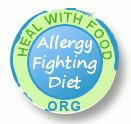Anti-Allergy Diet: The Best Vitamins and Nutrients for Allergy Relief

What are the most important vitamins, minerals and flavonoids for allergy sufferers? This page provides 7 diet tips for allergy sufferers who are interested in the dietary approach to preventing and stopping allergic reactions. Important notice: The information below and elsewhere on this website is not intended or implied to be a substitute for professional medical or health advice. Always seek the advice of a professional health care provider.
#1: Increase Your Intake of Omega-3 Fats, Limit Omega-6 Intake
Research suggests that a high consumption of omega-3 fatty acids is associated with a decreased risk of allergies. The beneficial effects of omega-3 fatty acids on allergies are likely to result from these fatty acids' anti-inflammatory properties. Most omega-6 fatty acids, on the other hand, can increase inflammation in the body by producing inflammatory prostaglandins ("type 2 prostaglandins") and thus worsen allergic symptoms.
However, this does not mean that you should eliminate all omega-6 fats from diet: a certain amount of these essential fatty acids is absolutely necessary to maintain the proper functioning of the human body. However, most modern diets in Western countries — where allergies are most prevalent — include too much of the inflammatory omega-6 fatty acids and not enough of the anti-inflammatory omega-3 acids. Simply consuming less refined vegetable oils like corn oil and safflower oil that are high in omega-6 fatty acids and consuming more foods high in omega-3 fatty acids (e.g. flaxseeds, walnuts, soybeans, and cold water fish like salmon, cod, and halibut) can bring relief to people with allergies.
#2: Include Herbs That Contain Rosmarinic Acid in Your Diet
Rosmarinic acid has been shown to suppress allergic reactions in test animals and, more recently, in humans. Rosmarinic acid has been shown to work by suppressing allergic immunoglobulin responses and inflammation caused by leukocytes. Rosmarinic acid is found in many culinary herbs such as rosemary, oregano, lemon balm, sage, marjoram, peppermint, and thyme.
#3: Eat Foods That Contain Quercetin
The bioflavonoid quercetin is an important anti-allergy nutrient. It is known to have antioxidant, anti-histamine, and anti-inflammatory properties, and studies suggest that it helps relieve allergic symptoms. Good dietary sources of quercetin include apples, capers, red and yellow onions, raspberries, lingonberries, cherries, cranberries, broccoli, red grapes, lovage, citrus fruits, red wine, and tea.
#4: Load on Foods That Provide Vitamin C
Vitamin C, a potent antioxidant, helps reduce inflammation which might cause symptoms in allergy sufferers. Studies have also shown that high levels of vitamin C help reduce histamine release in the body and make histamine break down faster. Histamine, a chemical produced by the body, is involved in many allergic reactions. The positive effects of vitamin C on allergies may be more pronounced when vitamin C is consumed together with vitamin E because these two vitamins work synergistically and protect each other.
#5: Step up Your Selenium Intake
Increasing your dietary intake of the trace element selenium through foods such as mushrooms, cod, shrimp, halibut and Brazil nuts, may help prevent and treat allergies. The beneficial effects of selenium on allergies are based on the ability of this trace mineral to produce special proteins that have antioxidant properties. To get the most out of selenium's antioxidant benefits, eat selenium rich foods together with foods that contain vitamin E (selenium boosts the effectiveness of vitamin E).
#6: Eat Plenty of Foods Rich in Vitamin E
Scientific research suggests that vitamin E (tocopherol) may be effective at suppressing allergic reactions. In one study with 2,633 participants, an increase in vitamin E intake was associated with a decrease in the levels of the allergy-related antibody IgE. Further, the study showed that a paltry one milligram increase in vitamin E could cause the serum antibody levels decrease by more than 5%.
#7: Consume Foods That Contain Probiotic Bacteria
Many experts agree that the health of the gastrointestinal system plays a key role in allergies. One way to promote the health of the intestines is to eat foods containing probiotic bacteria such as Lactobacillus acidophilus and Bifidobacterium bifidum (or L. acidophilus and bifidum, for short). These beneficial bacteria live in the gastrointestinal tract where they aid digestion and fight the overgrowth of disease-causing bacteria. Yoghurt containing live cultures of probiotic bacteria has been used as a folk remedy for hundreds, if not thousands, of years. Other dietary sources of probiotic bacteria include milk and sour milk enriched with the bacteria, miso, and tempeh. Increasing your intake of probiotic bacteria may be particularly beneficial if you have recently been taking an antibiotic medication as antibiotics are known to destroy the healthy flora in the intestines.

